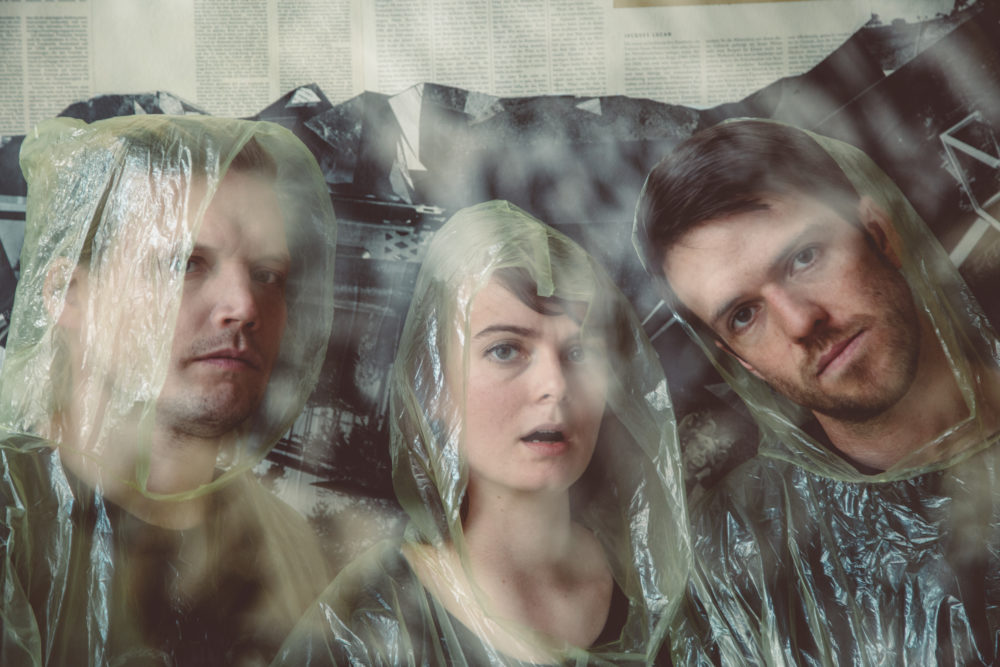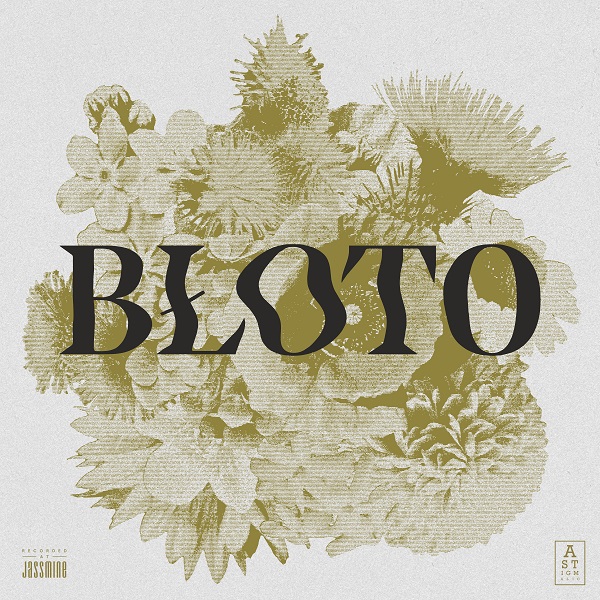
W związku z niedawno opublikowaną płytą tria Me&Mobi, postanowiliśmy zadać kilka pytań basistce tego niezwykłego zespołu. Najnowszy ich longplay nosi tytuł „Agglo” (recenzja).
Interview in English, scroll to the bottom
Łukasz Komła: Jak powstała grupa Me&Mobi?
Lisa Hoppe: Zespół założyliśmy pod koniec 2012 roku, podczas gdy wszyscy studiowaliśmy w Bernie (Szwajcaria). Z niewyjaśnionych powodów spotkaliśmy się najpierw w zespole swingowym, który nie był nam ani trochę bliski. Pomimo tych niezręcznych okoliczności, istniała między nami jakaś więź (śmiech), a może było to podobne poczucie humoru. Więc spotkaliśmy się po zajęciach, żeby grać muzykę, która nas cieszyła.
Kompozycje z albumu „Agglo” nazwałem: „krystaliczną magmą dźwięków zwiastujących przyszłość”. Co o tym sądzisz?
Posiadasz umiejętności telepatyczne a może jesteś dobrym badaczem – ponieważ rzeczywiście mieliśmy utwór, który został nazwany „Kristallin”. Ale poważnie, myślę, że to stwierdzenie odzwierciedla także nasze próby zwerbalizowania muzyki, jaka znalazła się na „Agglo”, mającej coś z obu tych pojęć; ciepło magmy i zimną geometrię kryształów, a zasadniczym rdzeniem jest dźwięk. Dźwięk mieszający się z naszymi oczekiwaniami, przypominający bardzo różne konteksty, które mogą wydawać się sprzeczne, prowokujące, kojące, odpychające… Duże połacie dźwięku, gdzie trudno wskazać kolejność ich powstawania. A na dodatek przeplata się to z wizjami możliwej przyszłości.
Muszę przyznać, że duże wrażenie zrobił na mnie materiał z „Agglo”. Mieszacie na nim przeróżne stylistyki, co oczywiście nie jest niczym nowym, ale robicie to w oryginalny sposób. Opowiedz jak pracowaliście w studiu, bo wiem, że był to bardzo ważny proces w trakcie nagrywania.
Dziękuję za komplement! Nagrywanie właściwie nie miało miejsca w studiu, wszystko rejestrowaliśmy przez wiele miesięcy w naszej sali prób. W ten sposób mieliśmy znacznie więcej czasu na słuchanie, wracanie i edytowanie materiału, a następnie na wprowadzanie zmian. Trzon większości utworów powstawał kiedy graliśmy razem na żywo, więc było to swoiste połączenie grania na żywo i overdubbingu. Spędzaliśmy we trójkę całe dnie pracując nad tym albumem. Wszyscy byliśmy bardzo pochłonięci.
Tytuł płyty nawiązuje do aglomeracji miejskiej. Czym ona jest dla ciebie?
Kiedy słyszę ludzi wypowiadających słowo „agglo” ma ono najczęściej negatywny wydźwięk. To nie jest „prawdziwe” miasto, choć mające jego cechy – gęste zaludnienie, beton, infrastrukturę, przemysł. I tak wygląda aktualny kierunek, w którym świat się rozwija – miasta rosną masowo na całym świecie. Na naszym albumie żonglujemy skojarzeniami dotyczącymi obszarów miejskich oraz szukamy piękna w brzydocie. Można powiedzieć, że zamieniamy typowy artystyczny romantyzm na naturalną estetykę przedmieść, dzielnic czy gett.
Wasza muzyka ma w sobie wiele odniesień, skojarzeń etc. Więc zapytam cię o twoje inspiracje. Co pobudza twoją muzyczną wyobraźnię?‚
To dobre pytanie, choć trudno na nie odpowiedzieć. Po pierwsze, każdy z nas ma inaczej, tym bardziej, że wszyscy mamy inne korzenie muzyczne oraz inklinacje. Mnie osobiście inspiruje do tworzenia własnej muzyki słuchanie innych artystów oraz wpływ zupełnie czegoś innego. Na przykład są to seriale sci-fi, takie jak „Dr. Who” czy „Firefly” – historie wszechświatów, które dotyczą różnych osi czasu, rzeczywistości i przyszłości. Zainspirowały mnie także powieści Harukiego Murakami i Alice Munro, mające podobną koncepcję magicznej rzeczywistości.
W czym upatrujesz przyszłość muzyki?
Sądzę, że dobrą rzeczą w związku z postrzeganiem przyszłości jest to, że pozostaje ona do pewnego stopnia nieprzewidywalna. Wydaje się, że muzyka w ciągu następnych lat będzie tworzona w oparciu o komputery. Zauważam także, iż piosenki nie są aż tak modne jak kiedyś – nikt nie pisze takich rzeczy jak Simon & Garfunkel albo wczesne Radiohead, o dość złożonych strukturach harmonicznych i melodycznych. Ale kto wie? Pomimo elektronicznej fali, której doświadczamy przez ostatnie dziesięć lat, wciąż mamy duże zainteresowanie songwriterami.
Niestety, ale jeszcze nie byłem na koncercie Me&Mobi, stąd moja myśl: jakie czynniki są dla was ważne, aby taki koncert było można zaliczyć do udanych?
W sumie każda sala jest w porządku, liczy się dobra atmosfera i ciekawa publiczność. Jesteśmy otwarci na sugestie! (śmiech).
Mam nadzieję, że w najbliższym czasie odwiedzicie Polskę i zagracie w całości „Agglo”.
Bardzo byśmy chcieli! Dziękuję.
Strona Me&Mobi »
Profil na Facebooku »
Strona Prolog Records »
Profil na Facebooku »
________________________________________________________________________
Łukasz Komła: How was the Me&Mobi team formed?
Lisa Hoppe: We founded the band in late 2012, while we were all studying in Bern, Switzerland. For mysterious reasons we met first in a mandatory swing ensemble, which non of us really enjoyed. Despite these pretty awkward circumstances, there was a connection between the three of us (smile), or maybe it was a mutual sense of humor. So we met after school, trying out some music that we were into.
Compositions from the recently published album „Agglo” I called in my review: „crystalline magma of sounds heralding the future”. What do you think about that?
You whether have telepathic skills, or you are a good researcher – because we actually had a song that was called „Kristallin”. But seriously, I think that meets pretty much our own attempts to verbalize the music on „Agglo”. It has something of both, the heat of magma and the cold geometry of crystals, and the essential core is sound. Sound that messes with your expectations, that reminds you of very different contexts, that seem to be contradicting, provoking, soothing, repulsive… Big chunks of sound in which you can’t tell how there were constructed in the first place. And on top of that we interweave that with visions from possible futures.
I must admit that the material from „Agglo” made a very great impression on me. You mix different styles on it, which is obviously nothing new, but you do it in an original way. Tell me how you worked in the studio, because I know that it was a very important process during recording.
Thanks for the compliment! So the recording actually didn’t take place in a studio but we recorded everything over the course of many months in our own rehearsal space. That way we had a hundred times more time for listening, reviewing and editing the material, and then changing and adding to it. Most of the songs have a basic core of a track that we played live together, so there was also a mixture of live recording and overdubbing. And we spent whole days together working on the album, the three of us, only doing that.
The title of the album refers to the urban agglomeration. What is the urban agglomeration for you?
When I hear people using the word „agglo” it has many times a negative meaning to it. Like it is not the „real” city, but with the features of one – dense population, concrete, infrastructure, industry. And that is also right now the direction the world is developing to – cities are growing massively worldwide. On our album we play with this perception of these urban areas – and seek the beauty in the ugliness. So to speak we replace the typical artistic romanticism of nature with the aesthetic of suburbs, neighborhoods and ghettos.
Your music has many references, associations etc. I need ask you about your inspirations. What stimulates your musical imagination?
That is good question, though a very difficult one to answer. First of all, that is different for the three of us, especially because we all have different musical backgrounds and bias. But to reply to that question personally, a big stimulation for writing music is for me a mixture of other music and something completely unrelated. And these things are for example science fiction series like „Dr. Who” and „Firefly” – story-universes that deal with different timelines, realities and futures. But also novels by Haruki Murakami and Alice Munro inspired me, which have a similar concept of a magic reality.
How do you see the future of music?
I guess the good thing about future is that it remains to a certain amount unpredictable. As things seem now, I would predict that the trend continues and more music is created on the computer in the next years. I also see that right now songs are not so much in fashion – nobody writes stuff like Simon & Garfunkel or early Radiohead, with rather complex harmonic and melodic structures. But who knows? Despite the electronic wave we’re experiencing for the last ten years, there is also a big boom with singer/songwriter right now.
Unfortunately, I have not been to the Me&Mobi concert yet, hence my thought: what factor must be met for you to be able to make such a concert successful?
Any room, a good P.A. and a curious audience. We’re open for suggestions! (smile)
Of course, I hope that in the near future you will visit Poland and play the whole „Agglo”.
We’d love to! Thanks.

